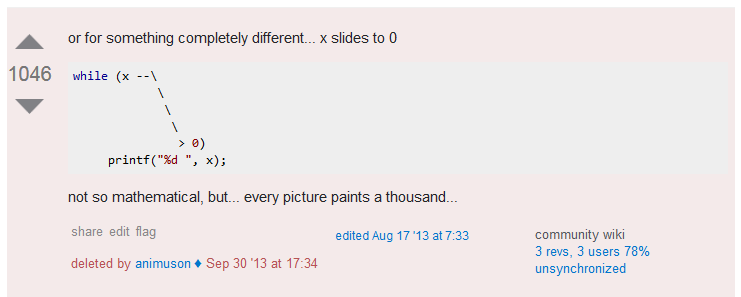It was not an answer. The question asked what the --> operator was called, whether it was defined in the standard, and where it came from. You could possibly stretch the question to asking what the operator does and how it works.
The answer you linked to doesn't actually answer any of those questions. Rather, it is a "me too"-style contribution, suggesting another way to write obfuscated code by the clever use of line-continuation characters.
The answer itself even admits that it isn't an answer, starting out as it does with "or for something completely different." Yeah, completely different from the question everyone else is talking about. Not a good way to start an answer if you want it to stick around.
This answer is accurate
I don't know what you mean by this. We've established it isn't an answer to the question, so you must be asserting that it is technically accurate, in the sense that the syntax does what is advertised. That may well be true, but it is equally true that they sell pinto beans by the pound at the grocery store. That does not an answer make.
taught me something
Let's hope to God not. I doubt you have or ever will see code like this in the wild, so it's not like it is useful to be able to understand what it does. The only possible thing it could have "taught" you is how to write code like this yourself. Which is something you should never do. It fails the "useful" test here, as well.
was highly up-voted
Yeah, so it was. Unfortunately, people will upvote any damn thing, especially if it is clever, funny, and understandable by everyone. The number of upvotes on the answer also has to be evaluated relative to the question, which has gotten a ridiculous number of votes itself, far more than anyone would have ever reasonably expected. That isn't really a good argument for keeping it around, although it does suggest that it would have been popular as a blog post.
It fails the most basic of tests that we apply to answers—does this provide an answer to the question—and, as such, was deleted by a moderator. There have been a bunch of other, similar, not-an-answer "answers" to that same question deleted. This is the trouble with popularity.
